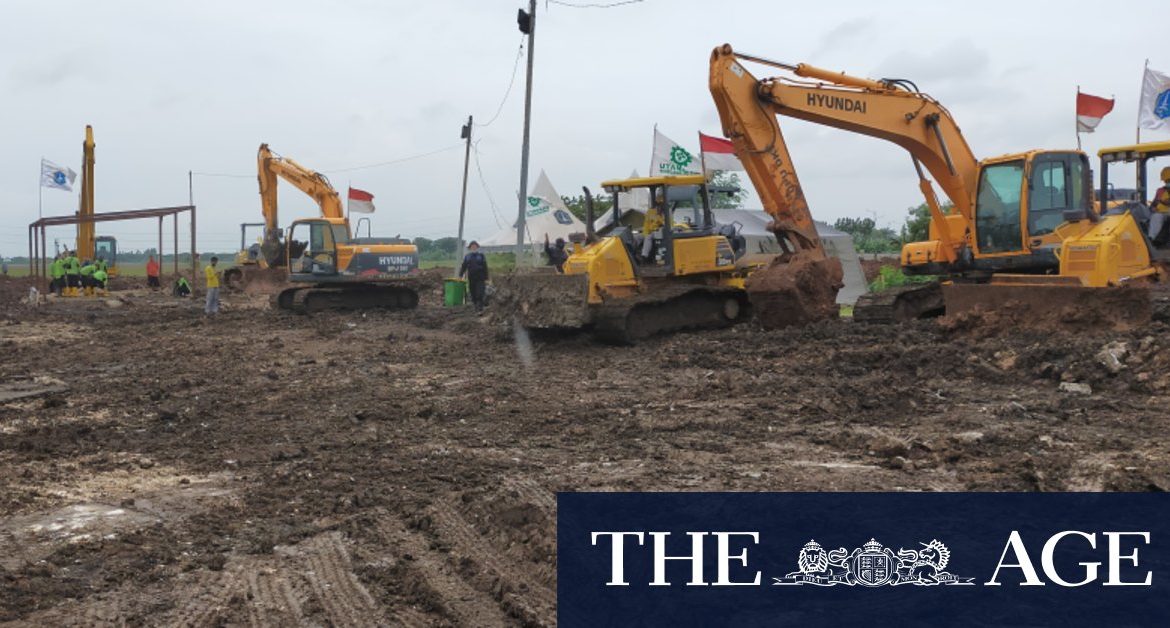In the space of four days in January, the number of daily burials in the city increased from 78 to 113. These include only confirmed and suspect COVID-19 deaths.
The government blamed the Christmas and New Year holidays for the worsening situation in the country. Jakarta has since extended its social restriction policy, which includes shorter opening hours for shopping centres and restaurants, to restrict people movement until February 8, to help bring down infection numbers.
New cemeteries are being built in a hurry in Jakarta to bury the COVID dead.Credit:Karuni Rompies
A 564-plot COVID-dedicated cemetery, Srengseng Sawah, opened in South Jakarta in December is already full.
Now, not far along, a 1.2-hectare block of land is being prepared to accommodate 1900 tombs next month.
Nurcahyo said if the existing cemeteries could not accommodate the increased number of coronavirus burials, the new facility and a new two-hectare, 1500-plot site being built on water-logged ground in North Jakarta would have to be fast-tracked.
Local residents have used the unoccupied land to grow crops such as rice, bananas and water spinach, Nurcahyo said.

The two-hectare Rorotan cemetery in North Jakarta will accommodate 1500 burials.Credit:Karuni Rompies
Asked if he anticipated having to open even more sites, Nurcahyo replied: “Our hope is that the pandemic will be over soon.”
He said the sites were also accepting the COVID dead from neighbouring areas such as Depok, Bekasi and Tangerang.
Indonesia recorded 11,948 new positive cases on Wednesday, bringing the total to 1,024,298. It has officially lost more than 28,000 people to the virus since the start of the pandemic, but experts say the number is likely to be much higher as testing is limited. Some 387 people died of it on Wednesday, according to the country’s official data. It has the highest death toll in South-east Asia.
Medical workers are among the groups most affected. Some 647 have lost their lives on the front line – among them 289 doctors, 27 dentists, 221 nurses, 84 midwives, 11 pharmacists and 15 laboratory staff, according to the Indonesia Medical Association or IDI quoted by local media. Among the doctors, 161 were general practitioners.
The administration of President Joko Widodo is giving vaccine priority to health workers and public officers after authorising the emergency use of the Chinese Sinovac vaccine. Joko and several top military, police and health officials received their second shots at the Presidential Palace on Thursday, along with a celebrity who is a social media influencer.
The Health Ministry data showed about 245,685 people have been vaccinated so far, most of them health workers, Reuters reported.
Loading
Authorities have been criticised for low testing and tracing rates, and for focusing on vaccines at the expense of better enforcing health protocols, which are less strict than in most countries.
Health Minister Budi Gunadi Sadikin said earlier this week that improvements would be made to contain the virus and urged the public to follow regulations.
“We need to flatten the curve […] so our health facilities don’t have too much burden and thus we could have more time to respond to this virus,” he told a news conference.
Hospitals have come under increasing strain, with dozens of people turned away from Jakarta facilities already at full capacity.
Student Muhaimin Zega, 20, called on the government to issue clearer regulations, while 42-year-old Jakarta resident Sabriyanti said the social rules needed to be more stringent.
“The government should be stricter because we still can see crowds and those who don’t wear masks,” Sabriyanti, who uses only one name, told the Associated Press.
Karuni Rompies is Assistant Indonesia Correspondent for The Sydney Morning Herald and The Age
Most Viewed in World
Loading







